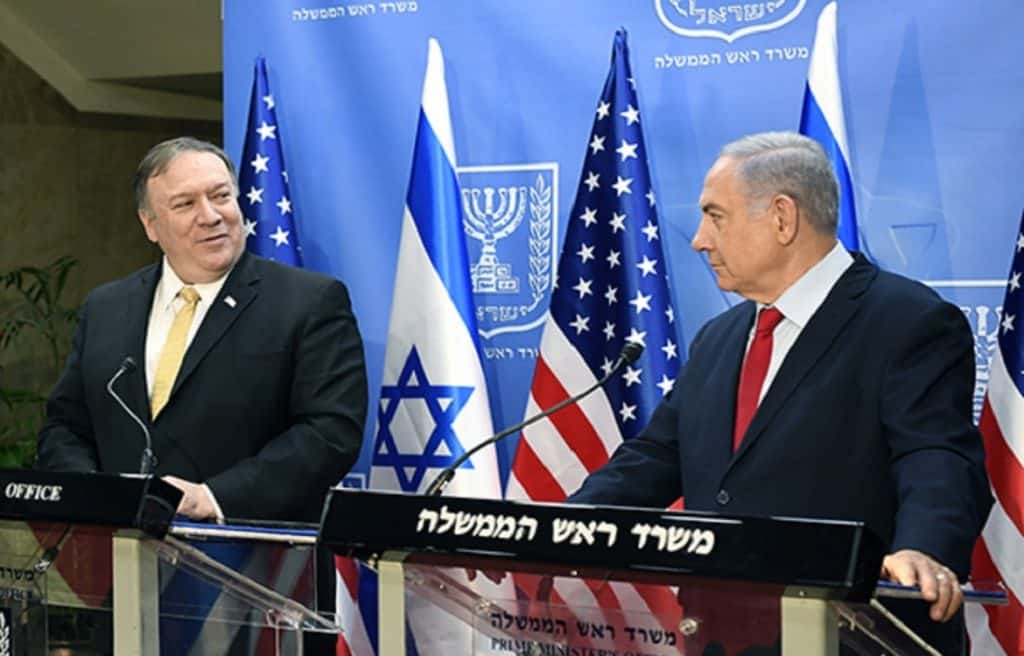By Denis Korkodinov
On May 13, 2020, US Secretary of State Mike Pompeo will officially visit Jerusalem. This is the first foreign visit of an American politician since the closure of the United States borders, 2 months ago, due to the COVID-19 pandemic.
The purpose of the view is to organize a US-Israel front against the Lebanese Hezbollah movement. Formally, Mike Pompeo plans to visit Jerusalem to express his support for Benjamin Netanyahu and Benny Ganz on the occasion of the formation of the coalition government. In addition, the US Secretary of State plans to discuss the details of the annexation of the Jordan Valley, announced by Israel, and about the Palestinian settlements located on it.
However, the main theme of the talks seems to be how to use the coronavirus situation to reduce Iran’s influence in the region. And to that end, Washington and Tel Aviv are ready to step up efforts to neutralize resistance from the Iranian delegates to Iraq, Syria and, above all, Lebanon, where the Hassan Nasrallah movement constitutes the main threat to US-Israel interests.
For sure, Washington has been actively working on this program for a year, and the situation with COVID-19 has now created unique conditions for a sharp turn in this direction. Furthermore, on the eve of the upcoming U.S. election, it is extremely important for Donald Trump to show another victory in the Middle East region to get the maximum number of votes.
The situation in Israel has developed very favorably for the implementation of the American plans. Benjamin Netanyahu, who is a traditional friend of the White House administration, and who also aims to put pressure on Hezbollah, is still the head of government.
The presence of Benny Ganz, who plays the second role in the coalition government, is not particularly annoying for Washington, because in one way or another the decisive word will be that of Benjamin Netanyahu.
In addition, Benny Gantz, former chief of staff of the Israeli defense forces, is unlikely to oppose the rise in prestige of the armed forces of Tel Aviv, which suffered a series of setbacks in the military campaign in 2000.
It is worth noting that Israel is now ready to begin military operations against the Iranian proxies, mainly because Tehran recently boasted the launch of the Nur space spy satellite, which will monitor all the movements of the Israeli army and will have the exact coordinates of the military structures located in Israel.
Furthermore, due to the increased activity of Hezbollah, Israel was almost completely surrounded by potential adversaries, which significantly increased their military potential, thus creating a real threat to the state’s national security.
Meanwhile, Hezbollah has gained extensive experience in conducting military operations in Syria, in the immediate vicinity of the Golan Heights and the Kuneitra region. In this regard, Tel Aviv is seriously afraid that the Lebanese movement’s combat experience will materialize in Israel.
The decline in the prestige of Arab countries led by Saudi Arabia, which have been significantly affected by the sharp drop in oil and coronavirus prices, may facilitate Tel Aviv’s military operations against Iran. In one way or another, the Arabs are unlikely to be embarrassed if Benjamin Netanyahu and Donald Trump start a war against the Ayatollah regime.
The Yemeni Hussites, who have managed to build a huge arsenal of Iranian-made ballistic missiles, are also one of the reasons why Israel could be ready to attack Iran-supported groups. Above all, the Ansar Allah movement, controlled by Tehran, poses significant obstacles to the movement of international goods along the Bab al-Mandeb strait and Aqaba bay.
The fact that Israel could attack Iran-supported movements in the near future is also demonstrated by the statement by Israeli war minister Naftali Bennett, who, speaking to journalists on May 7, 2020, said that the only condition for cessation of the Israeli attacks on Syria and Lebanon is the withdrawal of Iranian groups from these countries.
Based on this state of affairs, Tel Aviv probably awaits Washington’s approval. And Mike Pompeo, on his visit to Jerusalem, could provide Benjamin Netanyahu with such approval from the White House.
(The opinions expressed in this article are solely those of the author and do not necessarily reflect the views of World Geostrategic Insights)







